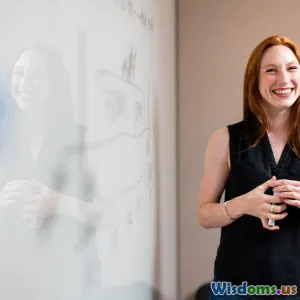
From Zero to Hero My Journey Freelancing as a Copywriter
7 min read A candid journey from novice to successful freelance copywriter, packed with insights and actionable advice. (0 Reviews)
From Zero to Hero: My Journey Freelancing as a Copywriter
Introduction
Stepping into the world of freelancing often feels like setting off on an uncharted voyage. For me, venturing into freelance copywriting was both terrifying and thrilling—a leap from complete uncertainty to achieving sustainable success. Have you ever wondered how someone with zero experience and no formal training can break into freelancing, dominate a niche, and build a thriving career? This article chronicles my personal journey: celebrating the struggles, dissecting the wins, and sharing actionable insights to inspire your own freelancing adventure.
The Start: Facing the Blank Page
When I first decided to become a freelance copywriter, my knowledge was limited to a vague understanding that copywriters write content that sells. Unlike many established writers with portfolios or degrees in communications, I was starting from scratch.
Overcoming Impostor Syndrome
My first obstacle was self-doubt. Impostor syndrome crept in, whispering that I wasn’t good enough or experienced enough. But acknowledging this feeling allowed me to combat it head-on. I immersed myself in learning – from online courses on platforms like Coursera to consuming legendary books like Ogilvy on Advertising.
Building Foundations: Skills and Portfolio
Learning the Craft
Copywriting is an art of persuasion. I learned that good copy taps into psychology, language, and customer needs. Neil Patel’s blog and Copyblogger became my daily reads, and I practiced writing headlines, calls to action, and product descriptions tirelessly.
Creating Real Work from Day One
Without previous clients or a portfolio, one must create opportunities. I wrote mock ads, product descriptions for imaginary brands, and rewrote website copy of existing businesses to showcase my skills online.
Eventually, I built a portfolio website detailing these samples, which proved invaluable in landing my first gigs.
Finding the First Clients: The Game Changer
Leveraging Freelance Platforms
I turned to freelance marketplaces like Upwork and Fiverr. While these platforms can be competitive and sometimes discouraging, persistence pays off. It took weeks of proposals and few rejections before securing my first $50 job rewriting a landing page.
Networking and Referrals
I realized that networking was critical. Attending local entrepreneur meetups and joining Facebook groups for startups allowed me to connect directly with clients needing copywriting help. Word-of-mouth from a satisfied small client grew my client base faster than job platforms.
Growing Skills and Income: Lessons Learned
Emphasizing Specialization
Copywriting covers many niches—from tech to health to finance. I decided to specialize in SaaS (Software as a Service) after recognizing the demand and my growing interest in technology startups. Specializing allowed me to charge premium rates over generalist writers.
Continuous Learning and Feedback
Feedback was a gift; some clients requested rewrites multiple times, teaching me precision and client management under pressure. I took online workshops by professional copywriters, invested in grammar tools like Grammarly, and studied conversion optimization techniques to increase both the quality and effectiveness of my work.
Time Management Tips
Freelancing brings freedom but also responsibility. Using tools like Trello for project tracking and Toggl for time logging helped me avoid burnout and meet deadlines consistently.
Challenges on the Path
Unpredictable Income
At the beginning, income was erratic. There were months with back-to-back projects, then silent periods. Creating a small financial buffer and diversifying clients was essential to stabilize my earnings.
Dealing With Difficult Clients
Not all clients are easy. I learned the importance of clear contracts outlining scope, deadlines, and payment terms to avoid conflicts. Sometimes, saying 'no' or walking away was necessary to maintain professionalism and sanity.
The Turning Point: Achieving Consistent Success
After about a year and a half, I reached a stage where regular clients came to me, referrals increased, and I could command rates triple my starting fees. My side passion project—a newsletter about copywriting tips—also gained a modest but engaged audience, opening additional opportunities for book deals and consulting.
Conclusion: From Zero to Hero—and Beyond
My journey from zero experience to a successful freelance copywriter was neither linear nor easy. It demanded resilience, continuous learning, strategic niche focus, and the courage to start despite doubts. For aspiring freelance copywriters, here are key takeaways:
- Start writing daily, even without clients to build your voice and skills.
- Build a portfolio showcasing your best work early.
- Leverage freelance platforms but complement them with personal networking.
- Specialize strategically, based on market demand and personal interest.
- Invest in continuous education and embrace client feedback.
- Manage your time efficiently and set financial buffers.
- Communicate clearly and professionally with clients.
Whether you’re at zero or looking to level up, remember that every freelancer’s story includes ups, downs, and breakthroughs. With persistence and strategy, ‘hero’ success in freelancing isn’t just a dream—it’s an achievable reality.
“Freelancing has taught me more about business, people, and myself than any classroom in the world.” — A personal reflection
If you're ready to start, take a step forward today: write a sample headline, set up a portfolio, or reach out to your first prospect. Your zero-to-hero story begins now.
Rate the Post
User Reviews
Popular Posts
















